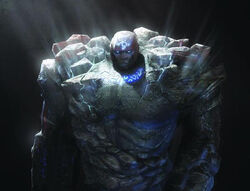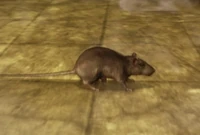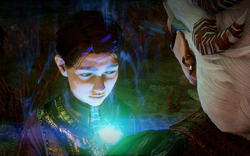“The body may die but the soul is ever-lasting.” ―A Blade of Hessarian
A soul is an incorporeal essence of a living being. This concept is shared by all known Thedosian cultures. It is sometimes referred to as "spirit"[1][2][3][4][5] (unlike a Fade spirit) or "essence".[6][3][7][8]
Origin and nature

According to the Chant of Light, the Fade began as an "ocean of dreams" and was reduced to a well when the Maker used its "emerald waters",[10] lyrium.[11] He "took from the Fade a measure of its living flesh" and created men.[12] The Maker gifted them with the spark of the divine, a soul[13] made of "dream and idea, hope and fear, endless possibilities."[12]
While purpose and relevance are paramount to a spirit, experiences and memories thereof define a soul. Unable to taste life themselves, demons seek out the dreaming in the Fade and draw sustenance from their memories.[14] They copy and thus preserve frozen moments that form vast oceans in the Fade.[15] Powerful demons can outright steal memories of the dreaming, making the person forget certain events.[16]
Races of Thedas devised various ways to store their experiences. Ancient elves recorded their memories in the Shattered Library before entering uthenera.[17] They developed close relationships with spirits, who acted as keepers of knowledge[18] and teachers.[19] As each servant of Mythal reached the end of their years, they would pass their knowledge on through the Well of Sorrows.[20] Some memories can be preserved with magic.[21] Dwarves keep their Memories in lyrium. They also created objects known as memory crystals.
Body and soul
“Bodies are such limiting things.” ―Flemeth
In life the soul is tied to a mortal body and thus restricted to a specific form. A notable exception are shapeshifter mages, who can turn into animals. In order to learn each new form such a mage must copy a creature's soul.[22]
The mortal body needs sustenance and will eventually decay and die. One's years can be extended by the lashing of soul to a Fade spirit. The latter can be forcefully bound with blood magic[23] or willingly provide the spark of life and remain a part of the soul.[24] Some elves in uthenera are said to have been able to reach "perfection" and draw sustenance from the Fade. Their bodies no longer required food or water.[25] A Witch of the Wilds prolonged the life of Xenon the Antiquarian, but his body decayed over time. Avernus was also able to unnaturally prolong his lifespan through blood magic and experimentation.

A part of the living essence or the soul in its entirety can be placed into an inanimate object. Thus a phylactery is a vessel, often a glass vial, containing the essence of a magical being[26] that is secured with blood magic.[27] A soul of an arcane warrior was trapped for centuries inside a phylactery found in the Brecilian Ruins.[28] Flemeth put a "small piece" of herself inside the amulet that Merrill used atop Sundermount to summon her.[29]
Paragon Caridin created golems by placing a soul of a dwarf inside a stone body.[30][31] He killed a dwarf at the Anvil of the Void and encased their soul in a newly forged body with the use of lyrium.[32] A magical, not mechanical, process animated the golem.[33]
Dreaming

From the Fade I crafted you,
And to the Fade you shall return
Each night in dreams
That you may always remember Me.[12]
When a person dreams, their soul temporarily leaves the body and passes into the Fade[1] where it is free to assume any form. Dwarves do not dream and their souls are normally not to be found in that realm.[34] If the souls of the dreaming are harmed or "killed", they return to their sleeping bodies and awaken before the moment of death.[13][35]
It is possible to enter the Fade through one's mind with magic and remain lucid.[34] Several mages may be required to perform the ritual, with their powers bolstered by lyrium or blood.[36] A single dreamer mage or even an ordinary mage using dreamer techniques[37] can perform the same feat. A soul of any individual can be sent into the Fade this way, including dwarves[38][39] and golems[40] However the magic that keeps conscious minds in the Fade also prevents them from returning to their bodies, meaning that they may die in both realms[13][35] There are known exceptions to this rule, when victims became Tranquil or simply woke up instead.[41]
Trapped souls
“You don't need to go back to that other world. You can stay here.” ―Katriel
Demons and some mages[42] can trap unfortunate souls in one of the Fade realms to feed upon them. Victims are bound to exist in an endless dream and are unable to return to their bodies until the captor is defeated. If they linger in the Fade for too long, their body will die.[43] Some souls choose to stay even when free to leave.[44] Yet others appear to get trapped after their deaths.[45][46]
If a mage is overwhelmed by the demon, the latter can control and twist the body through the captive spirit like a puppet, resulting in an abomination in its most direct meaning.[13][47] When the demon is defeated in the Fade, the control is broken and the mage's state is reversed.[48] However, the soul is left scarred by the experience and never truly recovers.[49]
Death and afterlife
- Main article: Funerary rites
Cross the Veil and the Fade and all the stars in the sky.
Rest at the Maker's right hand,
And be forgiven.[50]
The bond between spirit and physical body is generally broken upon death, though it may be preserved with magic[6][3] Most cultures agree that souls of the dead pass through the Veil and enter the Fade.[34] Even Fade spirits do not know what happens afterwards.[51] They believe there is a place for those souls beyond, but the details are obscured from them.[52]
The Chantry teaches that the faithful rest at the Maker's side. Until the Golden City turned black, the spirits of the dead gathered in it.[2] Since then they journey to a realm beyond the Fade to join the Maker instead.[13][51]
Nevarrans presume that when a soul crosses the Fade after death, it displaces a Fade spirit.[53]
Avvar believe in an afterlife governed by "the Lady of the Skies" where the dead are reunited with their kin. They also hold that some souls are destined to be reborn in a new body instead with no memories of their past selves. The resurrected Avvar are assumed to be guided by previous experiences through visions and portents.[7]
The Qunari call the Fade "the Land of the Dead". Entering this realm while still alive is forbidden by the Qun.[34] Its tenets emphasize that existence is a choice, and one can refuse it.[54]
Unlike all other races, dwarves believe that in death the spirits of the worthy return to and rest in the Stone after the words of a ritual are said.[4][55] They become the Ancestors who guide and care for their descendants for eternity as well as make the Stone stronger.[56]
In ancient Tevinter, black pearls were believed to be able to stop the soul from passing through the Veil when held in the mouth at the moment of death.[57]
Lost souls
We who are forgotten, remember.
Here we wait, in aeons of silence.
We few, we profane.[58]
Some cultures maintain that not all dead are worthy of the afterlife.

The Chantry teaches that the souls of sinners are left to wander in the Void, hopeless and forever lost.[59][2] They return to the ether from which they were formed when they enter the Fade.[13][60] Folk beliefs in Ferelden and Orlais elaborate that a dead man can become lost on his way to the Maker's side and turn into a ghost, forever adrift in a land of shadow.[61]
Dwarves believe that in death the Stone rejects the unworthy souls of their kin. They are said to become rock wraiths, beasts of stone that wander the Deep without rest and feed upon lyrium veins.[62][63] "Gangue" shades bound into the rock were once dwarves as well.[64]
Some sources claim that shades are unquiet spirits of the dead. They are lost souls that slipped from the Fade into the mortal world with no memories left of ever being alive.[65]
Tainted, soulless and immortal

Before darkness claims our souls
Let us see that shred of blue.[66]
- See also: Old Gods#The Souls
Ordinary darkspawn are believed to be soulless.[67][68]
Whenever their body is destroyed, the soul of an Archdemon[67][8][68][70] or one of the Magisters[71] passes to the nearest tainted creature, rendering them effectively immortal. The new body is then twisted into a preferred shape, though not necessarily instantly.[72]
Taint is said to corrupt the very soul of those affected, including Magisters Sidereal[73], Old Gods turned into the Archdemons[74] and Grey Wardens who went through the Joining ritual.[70][66]
Notes
- Asala means soul in Qunlat.[75] The Qunari also call distress caused by traumatic experience asala-taar, or "soul sickness". Tamassrans are tasked with curing it.[76]
Codex entries
References
| ||||||||||||||||||||||||
